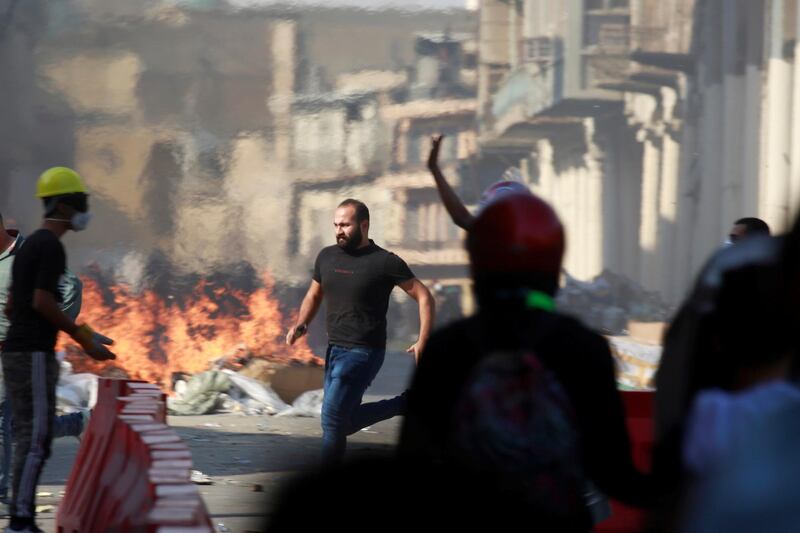For all Iran's efforts to establish a powerful network of allies throughout the Middle East, Tehran's attempts to achieve its long-held goal of regional domination are currently experiencing their most severe challenge in years as a result of the anti-government protests that are taking place in Lebanon and Iraq.
A definitive report published in London this week by the influential International Institute for Strategic Studies think tank sets out in detail how Iran has spent decades building what it calls “networks of influence” throughout the Middle East in an attempt to gain an advantage over its many adversaries.
But while the IISS’s report, “Iran’s Networks of Influence in the Middle East”, provides worrying detail about the extent of Iran’s malign meddling in the affairs of neighbouring Arab states, Tehran now finds itself in a desperate battle to maintain its influence over Lebanon and Iraq, countries which, until the recent wave of anti-government protests erupted, were key targets for Iranian attempts to consolidate its grip over vital areas of the Middle East.
According to the IISS, the network of alliances Iran has built in recent years means that it has a distinct advantage over other countries in the region when it comes to fighting wars.
This is because Iran relies heavily on proxies such as Hezbollah in Lebanon and Shia militias in Iraq to do its dirty work while most other countries rely on conventional firepower to protect their interests, and any action they take is governed by the internationally-recognised laws of war.
This has led the IISS to conclude that the balance of power in the Middle East is moving in Iran’s favour. It contends, moreover, that Iran’s ability to fight and win wars in the Middle East without resorting to conventional military forces has been allowed to develop because there has been no effective international response to Iran’s activities in the region.
The US and its allies still retain military superiority over Iran in terms of conventional forces, but Tehran has proved to be more effective in waging war in what is described as the “grey zone” of conflict.
This means Iran is able to avoid risking traditional “state-on-state” confrontations, which it would be likely to lose. Instead, by building what the report calls “networks of influence” with proxies throughout the region, Tehran has succeeded in gaining a distinct advantage over rivals in the region, such as Saudi Arabia.
“Iran is fighting and winning wars ‘fought amongst the people’, not wars between states,” the report concludes.
The report cites Iran's recent success in helping the Assad regime to emerge triumphant in Syria's bitter civil war, as well as its involvement in Iraq and Yemen, where it has backed the Houthi rebels, as recent examples of conducting war through third parties.
But while it is undoubtedly true that there has been a significant increase in Iran’s attempts to spread its influence throughout the Arab world, especially since Tehran signed the 2015 nuclear deal, there is evidence that resistance is growing throughout the Arab world to Iran’s attempts to meddle in their affairs.
The most vivid example of this new trend of anti-Iran sentiment can be seen in Iraq, where the anti-government protests that have rocked the country are increasingly being directed at Iran’s presence in the country.
Iran’s attempts to extend its influence in Iraq date back to the sectarian violence that affected the country in the aftermath of the overthrow of Iraqi dictator Saddam Hussein in 2003, when Iran funded, armed and supported numerous Shia militias in the country. More recently it has expanded its involvement in Baghdad’s affairs through Tehran’s support for the so-called Popular Mobilisation Forces (PMF).
A clear sign that all is not well with Iran’s military investment in Iraq has been the appearance in Baghdad of Qassem Suleimani, the head of the Revolutionary Guards Quds Force. As the man who is personally responsible for exporting Iran’s Islamic revolution throughout the Arab world, Mr Suleimani’s primary mission was to prevent Prime Minister Adel Abdul Mahdi from resigning.
Mr Suleimani’s recent activities in Baghdad reflect just how much influence Tehran has come to exert over how the Iraqi government conducts its affairs. The day after the protests began, for example, Mr Suleimani is reported to have chaired a meeting with top Iraqi security officials in Baghdad, a role that is normally fulfilled by the country’s prime minister. The following day more than 100 people were killed at the hands of unidentified snipers and members of Iran-backed militias such as the PMF.
Unfortunately for Iran, its strong-arm tactics have made little impression on the protesters, despite the fact that the death toll from the protests in Iraq now is at least 267. Last week saw the biggest protests in Iraq since the fall of Saddam Hussein, with thousands gathering in central Baghdad. Elsewhere, protesters attacked the Iranian consulate in the Shiite holy city of Karbala, where they scaled the concrete barriers surrounding the building before removing the Iranian flag and replacing it with an Iraqi one. There have also been attacks on PMF militia bases in Nasiriyah and Diwaniyah, where 13 demonstrators were killed when the headquarters of the Iranian-backed Badr Organisation was set alight.
In Lebanon, meanwhile, there have been reports of Hezbollah fighters attacking peaceful protesters as Iran tries desperately to prevent losing its stake in its most important Middle Eastern ally. There are even reports of anti-Hezbollah protests having taken place in Baalbeck, which has been an Iranian stronghold in Lebanon since Iran first established its proxy militia in the country in 1984.
Thus, no matter how Iran tries to build its influence throughout the region, the message that is coming loud and clear from all quarters of the Arab world is that Iran’s attempts to meddle in their affairs is deeply unwelcome.
Con Coughlin is the Telegraph’s Defence and Foreign Affairs Editor





